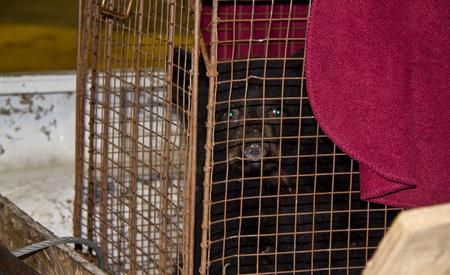Three orphaned bear cubs were recently rescued due to the efforts of a local wildlife enthusiast.
Better known for tracking whale and dolphin sightings on her Whales and Dolphins BC website, Susan MacKay said concerned citizens asked her to step in after spotting severely underweight bear cubs in inhabited areas.
“Someone contacted me because they didn’t know what to do after talking to conservation officials,” said MacKay. “So I told them to let me know if they wanted me to jump in and help.”
As several bears and cubs have been destroyed by conservation officials this year, MacKay said there was concern that malnourished cubs seen in the area of Catalyst Paper Corporation, Padgett Road and Cranberry Lake could meet the same fate.
MacKay said Critter Care, a wildlife care facility in Langley, BC, agreed to help rescue the orphaned cubs. Using traps sent by Critter Care, MacKay said the first cub was rescued on Monday, November 16 on Catalyst property.
MacKay also helped trap two other bears on Saturday, November 28. All three cubs were flown to the Lower Mainland for rehabilitation, courtesy of Pacific Coastal Airlines.
Critter Care senior animal care supervisor Angelo Fontana said the cubs were severely undernourished for their age. While cubs born in January or February should weigh anywhere between 40 to 60 pounds, she said the cubs from Powell River weighed 28, 25 and 19 pounds respectively.
Despite being underweight, Fontana said all the cubs, two females and a male, are eating well with an excellent chance of making a good recovery. Another plus, said Fontana, is the cubs are not acclimated to people.
“They definitely do not like people, so that is a good sign,” said Fontana. “Our job here is to hide food for them and leave them alone to be bears. So even though they are not in the wild, they are still having to forage for food.”
Should all go well, Fontana said the cubs will be returned to Powell River in the spring by truck.
If bear cubs are captured and are suitable candidates, namely healthy and not habituated to humans, BC Conservation Officer Service policy states cubs can be taken to wildlife-rescue facilities.
Conservation officers were not directly involved in this case, however, and they don’t condone others trapping cubs, according to Chris Doyle, officer in charge of operations for the South Coast.
Powell River conservation officer Andrew Anaka said just under 10 orphaned cubs have been reported in the Powell River area this year. In a typical year, only one or two might be reported, he said.
“There were a lot more bears in town this year than usual,” he said. “This leads to greater adverse interactions, such as injuries from motor vehicle accidents and bear-on-bear interactions, which may result in abandoned cubs.”
Due to lack of food, Anaka said many sows might not allow their cubs to den with them, leading to some cubs being abandoned rather than orphaned.
“We did not orphan any cubs this year as a result of the destruction of sow black bears,” said Anaka.
Anaka has some doubts about whether or not the rescued cubs will be able to fend for themselves if they are returned to the wild.
“These bears aren’t rehabbed,” said Anaka. “These cubs at Critter Care will be released near our community without the benefit of learning what they need to know [from their mother] to survive.”
Anaka said he is concerned whether the bears will be able to find sufficient food to survive and keep out of trouble if they return at an unusually high weight after eating all winter.
“I suppose we will find out,” he said. “They will be tagged, so if seen, their whereabouts can be tracked.”
According to Doyle, 600 bear complaints were reported in the area this year, and 36 bears destroyed, including eight cubs.
Critter Care is currently at capacity with 26 bears.
Doyle said that BC Conservation Officer Service is currently working on finding alternative facilities for other bears.



